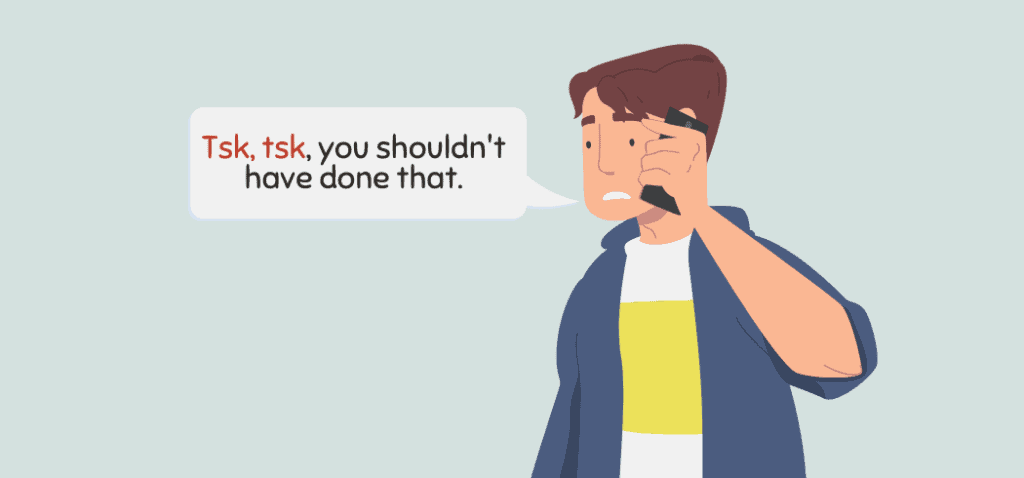The English language is full of interesting expressions and onomatopoeic words that imitate the sounds they represent. Take “tsk, tsk” and “tisk, tisk,” for example. I use these sounds in my fiction writing all the time to convey a character’s mild disapproval of something. It’s like saying, “shame on you.” But which is it? Tsk, tsk or tisk, tisk? Let’s find out!
Is It Tsk, Tsk or Tisk, Tisk?

The correct spelling you should use for the expression is “tisk, tisk,” which you’d use if you’re referring to the sound, not making the sound. But if you were writing the sound as an effect, you’d use “tsk, tsk.” Also, always use a comma between the words unless you’re using it as a verb. Let’s break it down some more.
Tisk, Tisk Meaning
Tsk and tisk make the same sound when you say them, so the only issue with differences is in the spelling and context. When using “tisk, tisk,” it’s a noun, meaning you’re referring to the sound or writing some narrative about it.
- “Don’t you tisk, tisk at me!”
- I wanted to shake my head and tisk, tisk at him, but I knew it’d be a waste of emotions.
Tsk, Tsk Meaning
Then we have “tsk, tsk,” which is an interjection and is spelled without the use of the letter I in each. It’s an onomatopoeic expression that imitates the sound someone makes when clicking their tongue against the roof of the mouth, done twice and quickly. You’d use it to show your disapproval of something or someone’s behavior.
- “Tsk, tsk.” He leaned against the wall. “You shouldn’t have done that.”
Verbs and Nouns
The interjection can be used as both a verb and a noun, depending on the context. As a noun, it shows your disappointment or disapproval of something. But as a verb, it expresses emotion. Also, use a hyphen between the two words when in verb form.
- Noun: “Tsk, tsk, I can’t believe you ate all the cookies,” my mom said disapprovingly.
- Verb: “I can’t believe you ate all the cookies,” my mom tsk-tsked at me.
Tsk, Tsk Meaning in Chat
In the area of chat or text conversations, “tsk, tsk” is used to playfully chide or tease someone, expressing mild disapproval or disappointment. It’s meant to be taken in a light-hearted manner and not really meant as a serious reprimand.
If my husband sent me a text and told me he bought yet another video game, I might reply with “tsk, tsk” to relay the sound of disappointment. But, sometimes, spelling it as “tisk, tisk” conveys a more sarcastic tone.
How to Pronounce Tisk, Tisk
You should pronounce “tisk, tisk” the same as you would “tsk, tsk.” To say it, make a clicking sound by quickly pressing your tongue against the roof of your mouth and then releasing it. Do this twice really fast.
Another Way to Say Tisk, Tisk
- Tut, tut
Tisk, Tisk and Tsk, Tsk Examples in a Sentence

- “Tsk, tsk, you really should have studied for that test,” she said playfully as her friend shared the disappointing grade.
- When Jack saw the mess in his sister Charlie’s room, he shook his head and said, “Tsk, tsk, someone needs to clean up before Mom and Dad find it.”
- The manager made a tisk, tisk sound. “You’re late again,” they teased the employee, who had a habit of arriving just a few minutes late each day.
- “Candace! You bought another special edition book?” tsk-tsked her husband.
- “Tsk, tsk,” she clucked her tongue. “You’re going to pay for what you did.”
Tisk, Tisk, Tisk
It’s a fine line between tsk, tsk and tisk, tisk because they’re both meant to be used to show your disapproval of something. But just remember, tsk is the sound, while the noun tisk is the spelling of the sound. Keep that in your mind, and you shouldn’t have any issues writing the expression.

Comments are closed.